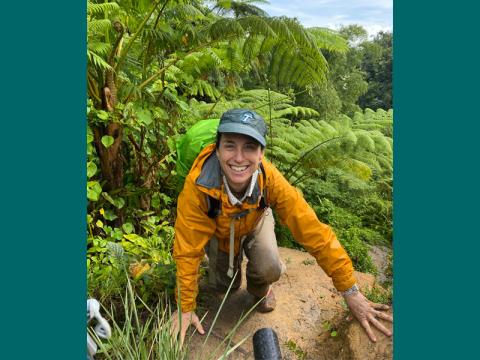Tulane geologist wins national award for research and outreach
Nicole Gasparini, a geologist in the Tulane University School of Science and Engineering, has won numerous awards during her professional career, but the latest one might be the most satisfying.
Gasparini has been named the winner of the 2021 Marguerite T. Williams Award, given annually by the American Geophysical Union’s Earth and Planetary Surface Processes Section. The award is named for the nation’s first Black woman to earn a PhD in geology in 1942. She was 47 at the time, having returned to college mid-career.
“I can’t even imagine the hardships she had to overcome,” Gasparini said. “She devoted her life to teaching and working in her community. It is incredibly humbling to receive an award named for her, especially because this award is given for both scientific contributions and community building.”
Community building and outreach is as important to Gasparini as her scientific research. In December of 2019, for example, she and her students brought a hands-on geology class to visually impaired youth at Louisiana Lighthouse.
“One of my career goals is to make my scientific community accessible for everyone who wants to be here. I want my community to become a place where everyone can thrive. These are lofty goals, and I can’t achieve them alone, but this is what I dream about.”
Gasparini’s research explores how landscapes evolve over different spatial and temporal scales. She is a co-developer of CHILD (Channel-Hillslope Integrated Landscape Development model) and Landlab, two widely used open-source numerical tools for modeling surface process. She and her research team use field observations, numerical landscape simulations, remotely sensed data and data collected by collaborators and government agencies to explore questions that intersect hydrology, tectonics and sedimentology with geomorphology at the core.
Her work has been published in such high-profile journals as Nature, Nature Communications and Geology, and she is currently the principal investigator on six projects funded by the National Science Foundation.
“Half of these are basic science, with study areas in Puerto Rico, New Mexico, Utah and Sicily. Two are for education and broadening participation in science. And the last one is for proof-of-concept illustrations of Landlab's capabilities,” she said.
Last year, Gasparini received the Presidential Citation for Science and Society from the AGU for her work in developing a petition for an anti-racism plan in the geosciences. In addition, she became a fellow of the Geological Society of America, an international geoscience organization.
She will receive the Marguerite T. Williams Award at the AGU’s annual meeting later this year in New Orleans. Although she only learned about Williams and her story two years ago, Gasparini said she will always consider her a role model.
“There are so many pioneers in the STEM fields who have been hidden, she said. “I wish I had known about her and her accomplishments when I was a struggling grad student. Role models are so important, especially for those who are minoritized in their fields.”

